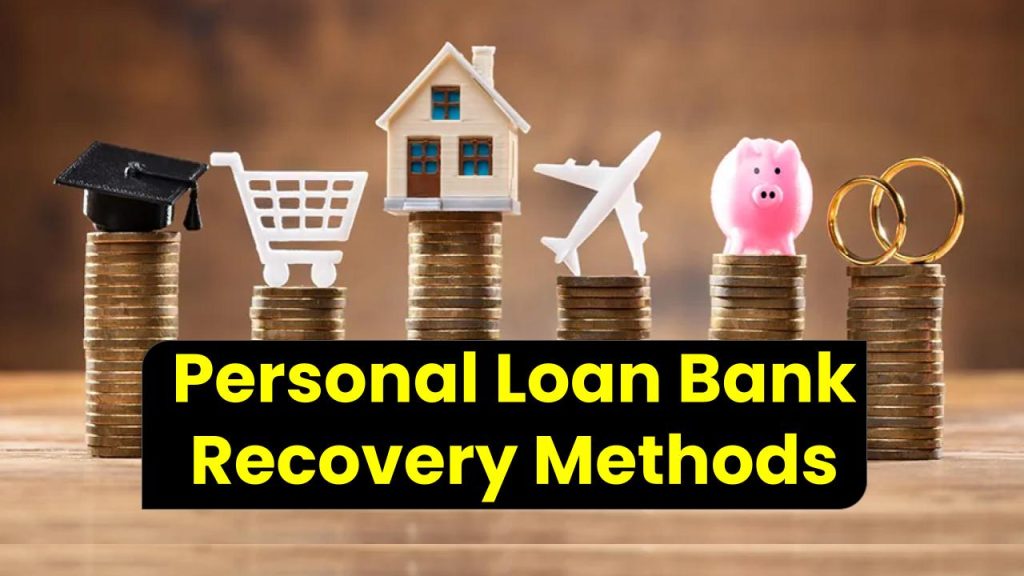
Defaulting on a personal loan can lead to serious consequences, both legally and financially. Whether you’re facing temporary hardship or struggling long-term, it’s important to understand what happens if you do not repay a personal loan and the various methods banks may adopt to recover the dues. In this article, we break it down clearly and professionally so you can make the best decisions for your financial future.
Personal loans are unsecured, which means they don’t require collateral like a house or gold. But this also means banks are stricter with recoveries because they don’t have any asset to fall back on. The good news? There are ways to manage a default before it spirals out of control.
Personal Loan Bank Recovery Methods Explained
| Detail | Information |
|---|---|
| Loan Default Impact | Lowers credit score, legal action possible, recovery agents may be involved |
| RBI Guidelines | Banks must follow ethical recovery practices; harassment is illegal |
| Legal Action | Banks may approach Lok Adalat or Debt Recovery Tribunal (DRT) |
| Credit Score Drop | One missed EMI can reduce score by 50-100 points (Source: CIBIL) |
| Solutions | Loan restructuring, EMI deferment, settlement negotiations |
Defaulting on a personal loan is a serious matter, but it’s not the end of the road. The earlier you act, the more options you have. Banks are willing to help if you approach them in time. Remember, your credit score is your financial passport—protect it like your future depends on it, because it does.
Understanding Personal Loan Defaults
A loan default occurs when you miss one or more EMI payments. Typically, if you delay a payment by more than 90 days, the account is classified as a Non-Performing Asset (NPA). This can trigger the recovery process.
Why Do People Default on Loans?
- Job loss or salary delay
- Medical emergencies
- Poor financial planning
- Excessive debt from other loans or credit cards
What Happens Immediately After a Missed EMI?
Banks usually send reminders via SMS, email, and phone calls. If the EMI is missed for more than 30 days, the lender may:
- Impose a late fee (usually 2-3% per month on the overdue amount)
- Report the delay to credit bureaus like CIBIL or Experian
- Start sending recovery notices
see also: These Rules Related to Your Money Will Change from April 1
Consequences of Not Repaying a Personal Loan
1. Negative Impact on Credit Score
Even one missed EMI can reduce your credit score by 50 to 100 points. A poor credit score affects your chances of getting future loans, credit cards, or even job offers in finance sectors.
According to CIBIL, a score below 650 is considered risky for most banks.
2. Increased Loan Burden
Interest continues to pile up. Some banks also charge a penal interest in addition to regular interest.
3. Recovery Agents Get Involved
If you miss multiple EMIs, banks may appoint third-party recovery agents. These agents are trained to recover dues but must follow strict RBI guidelines on behavior, including no harassment or threats.
4. Legal Proceedings
Banks can initiate legal action under the Negotiable Instruments Act or file a case with:
- Lok Adalat for loans below Rs 10 lakh
- Debt Recovery Tribunal (DRT) for loans above Rs 20 lakh
Note: Personal loans are civil matters; you cannot be arrested for default, but legal costs and judgments can affect you.
What Recovery Methods Do Banks Use?
Step 1: Reminder Calls & Emails
The process starts with soft reminders. This is the best time to respond and explain your situation. You may even get a few days of grace period.
Step 2: Late Fees & Credit Bureau Reporting
Missed EMIs are reported to credit bureaus, and your score takes a hit. Late charges begin accumulating.
Step 3: Recovery Agents
After 60-90 days, banks may send recovery agents. These agents cannot:
- Visit your home before 7 a.m. or after 7 p.m.
- Use abusive language
- Threaten or harass you
RBI mandates that banks maintain proper logs of recovery calls and visits.
Step 4: Legal Action
If recovery fails, banks may take you to court or seek a settlement through Lok Adalat or DRT.
What Can You Do If You Can’t Repay the Loan?
1. Talk to Your Bank Immediately
Be honest about your financial condition. Many banks offer relief options if you explain your situation.
2. Loan Restructuring
This involves extending the loan tenure or lowering EMIs. RBI allowed banks to offer this especially post-COVID.
3. EMI Moratorium or Pause
In special cases like job loss or medical emergencies, banks may allow you to pause EMIs temporarily.
4. Loan Settlement
This is a one-time settlement offer from the bank to close the loan for a lesser amount. It will reflect as “settled” on your credit report, which is not ideal but better than a default.
5. Seek Help from a Credit Counselor
Organizations like Credit Sudhaar, CIBIL counselors, or Paytm Credit Assist can help you restructure your finances.
RBI Guidelines to Protect Borrowers
The Reserve Bank of India (RBI) has strict norms to ensure borrowers are treated fairly:
- No harassment or abuse
- No calls at odd hours
- Banks must provide notice before initiating legal action
- Borrowers should be given a chance to restructure
see also: What Happens If You Break a Fixed Deposit? Know the Impact on Penalty and Interest
Personal Loan Bank Recovery Methods FAQs
Q1. Can I go to jail for not repaying a personal loan?
No, personal loan default is a civil issue, not a criminal offense. However, banks can take legal action to recover dues.
Q2. How many EMIs can I miss before default is declared?
Generally, if you miss three consecutive EMIs, your loan is marked as an NPA (Non-Performing Asset).
Q3. Can the bank seize my assets?
Since personal loans are unsecured, banks can’t seize your assets directly. But they can approach courts for compensation.
Q4. How long does a default stay on my credit report?
A default stays on your CIBIL report for 7 years and can impact all future borrowing.
Q5. Is it possible to remove a loan default from my credit report?
Only if the bank agrees to a full repayment or issues a No Dues Certificate post settlement. Otherwise, it remains.











